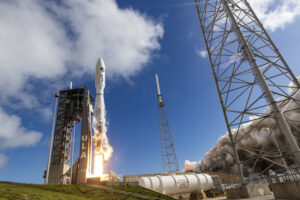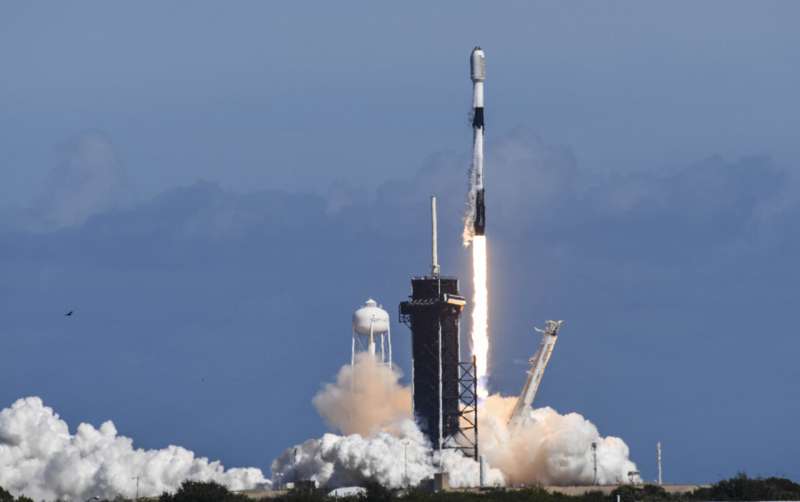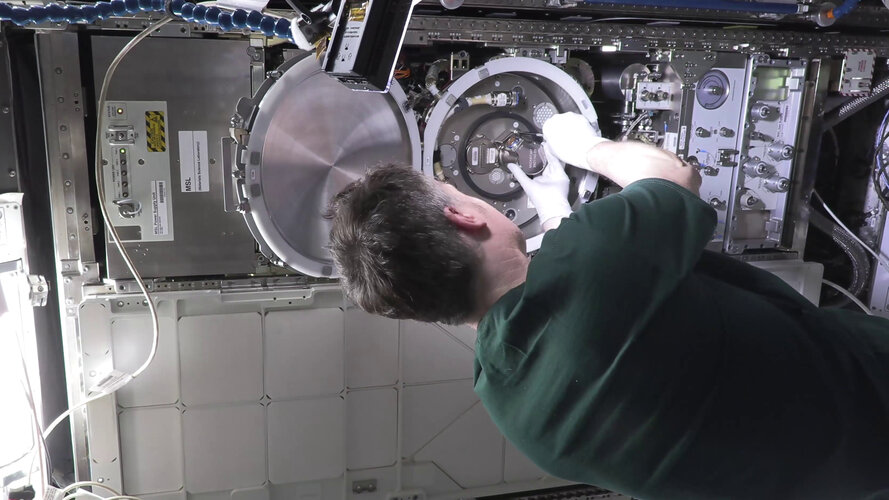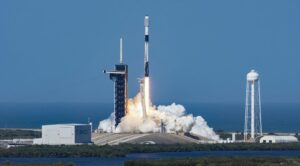Space Force asks launch companies for insight on where the industry is going
Wednesday, 09 February 2022 23:24
The U.S. Space Force is trying to identify what launch companies might challenge SpaceX and United Launch Alliance when their current contracts are re-competed in 2024.
The post Space Force asks launch companies for insight on where the industry is going appeared first on SpaceNews.
Surprisingly high fraction of dead galaxies found in ancient galactic 'city'
Wednesday, 09 February 2022 21:03
Dozens of SpaceX internet satellites lost to geomagnetic storm
Wednesday, 09 February 2022 20:51 Up to 40 SpaceX high-speed internet satellites have been knocked out of orbit by a geomagnetic storm shortly after launch, but pose little threat to Earth as they burn up in the atmosphere, the company said.
Geomagnetic storms are caused by ejections of the solar corona into space, resulting in disturbances to the Earth's upper atmosphere and increased drag on objects in low orbits.
The
Up to 40 SpaceX high-speed internet satellites have been knocked out of orbit by a geomagnetic storm shortly after launch, but pose little threat to Earth as they burn up in the atmosphere, the company said.
Geomagnetic storms are caused by ejections of the solar corona into space, resulting in disturbances to the Earth's upper atmosphere and increased drag on objects in low orbits.
The Viasat adds polar coverage to ground station-as-a-service business
Wednesday, 09 February 2022 17:31
Viasat plans to deploy an antenna in Sweden in April to give its ground station-as-a-service business polar coverage for the first time, the California-based satellite operator said Feb. 9.
The post Viasat adds polar coverage to ground station-as-a-service business appeared first on SpaceNews.
Satellite IoT companies don’t see broadband systems as competitors
Wednesday, 09 February 2022 16:07
Companies developing internet-of-things satellite constellations don’t see other broadband megaconstellations as direct competitors, but some see an opportunity to learn from them.
The post Satellite IoT companies don’t see broadband systems as competitors appeared first on SpaceNews.
SpaceX satellites falling out of orbit after solar storm
Wednesday, 09 February 2022 15:11
Materials science in motion | Cosmic Kiss
Wednesday, 09 February 2022 14:00 Video:
00:02:01
Video:
00:02:01
Watch ESA astronaut Matthias Maurer exchange a sample in the Materials Science Laboratory (MSL) on the International Space Station.
The sample is for an experiment called MICAST that aims to deepen our understanding of the physical principles that govern solidification processes in metal alloys. This knowledge could help improve casting processes on Earth, leading to the development of new lightweight, high-performance materials for future spacecraft and innovation.
Matthias is spending approximately six months aboard the Space Station for his ESA mission Cosmic Kiss. During this time, he will support around 36 European and many more international experiments in orbit.
China plans more than 50 space launches in 2022
Wednesday, 09 February 2022 12:55
China’s main space contractor aims to launch at least 140 spacecraft across more than 50 launches in 2022 following its busiest year in space so far.
Dozens of Starlink satellites from latest launch to reenter after geomagnetic storm
Wednesday, 09 February 2022 11:32
Up to 80% of the Starlink satellites launched by SpaceX last week will soon reenter, or have already done so, because a geomagnetic storm kept the spacecraft from raising their orbits.
The post Dozens of Starlink satellites from latest launch to reenter after geomagnetic storm appeared first on SpaceNews.
New Space-Based Weather Instruments Start Gathering Data
Wednesday, 09 February 2022 09:21 After being installed on the International Space Station, two small instruments designed and built at NASA's Jet Propulsion Laboratory in Southern California were powered up Jan. 7 and began collecting data on Earth's ocean winds and atmospheric water vapor - critical information required for weather and marine forecasts. Within two days, the Compact Ocean Wind Ve
After being installed on the International Space Station, two small instruments designed and built at NASA's Jet Propulsion Laboratory in Southern California were powered up Jan. 7 and began collecting data on Earth's ocean winds and atmospheric water vapor - critical information required for weather and marine forecasts. Within two days, the Compact Ocean Wind Ve Satellites and light reflections help spot coastal plastic waste
Wednesday, 09 February 2022 09:21 Millions of tons of plastic enter the oceans every year. While stopping this flow is crucial, so is tracking down what's already there so we can clean it up.
This cutting-edge research harnesses the latest in satellite technology to do just that.
The study, now published in Remote Sensing, used the unique infrared signals reflected by plastics to identify even tiny scraps amongst vas
Millions of tons of plastic enter the oceans every year. While stopping this flow is crucial, so is tracking down what's already there so we can clean it up.
This cutting-edge research harnesses the latest in satellite technology to do just that.
The study, now published in Remote Sensing, used the unique infrared signals reflected by plastics to identify even tiny scraps amongst vas New lightweight material is stronger than steel
Wednesday, 09 February 2022 09:21 Using a novel polymerization process, MIT chemical engineers have created a new material that is stronger than steel and as light as plastic, and can be easily manufactured in large quantities.
The new material is a two-dimensional polymer that self-assembles into sheets, unlike all other polymers, which form one-dimensional, spaghetti-like chains. Until now, scientists had believed it was
Using a novel polymerization process, MIT chemical engineers have created a new material that is stronger than steel and as light as plastic, and can be easily manufactured in large quantities.
The new material is a two-dimensional polymer that self-assembles into sheets, unlike all other polymers, which form one-dimensional, spaghetti-like chains. Until now, scientists had believed it was Persistence, encouragement, innovation keeps NASA's DAVINCI on track
Wednesday, 09 February 2022 09:21 The concept of a NASA-led Venus deep atmosphere chemistry probe was developed and evolved over more than a decade. Through multiple mission bids starting in 2008, rejections and tailored re-designs, a team of scientists and engineers finally prevailed with the selection of the Deep Atmosphere Venus Investigation of Noble gases, Chemistry, and Imaging, or DAVINCI mission in June 2021.
Among
The concept of a NASA-led Venus deep atmosphere chemistry probe was developed and evolved over more than a decade. Through multiple mission bids starting in 2008, rejections and tailored re-designs, a team of scientists and engineers finally prevailed with the selection of the Deep Atmosphere Venus Investigation of Noble gases, Chemistry, and Imaging, or DAVINCI mission in June 2021.
Among ESA hosts new office to coordinate global climate modelling push
Wednesday, 09 February 2022 07:55
Climate models are an important tool for scientists to understand our past climate and provide projections of future change. As such, they are in increasing demand as part of efforts to avert global warming and reduce risks associated with environmental change. To meet this demand, the World Climate Research Programme will open a new international office in the United Kingdom on 1 March 2022 that will coordinate the programme’s Climate Model Intercomparison Project.
Workers clean Apollo 16 spaceship ahead of 50th anniversary
Wednesday, 09 February 2022 07:47

